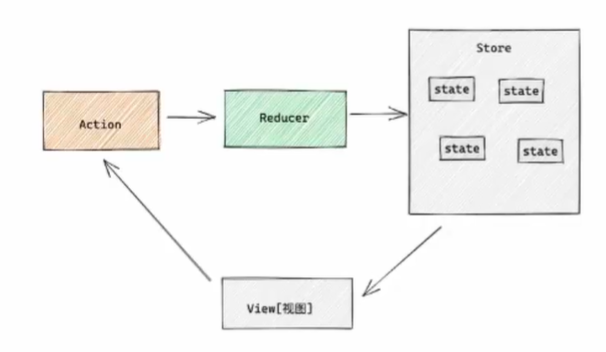Redux
Redux 是 React 最常用的 集中状态管理工具 ,类似于 Vue 中的 Pinia(Vuex), 可以独立于框架运行
作用:通过集中管理的方式管理应用的状态
使用步骤:
- 定义一个 reducer 函数 (根据当前想要做的修改返回一个新的状态)
作用:根据不同的 action 对象,返回不同的新的 state
1
2
3
4
5
6
7
8
9
10
11
|
function reducer(state = { count: 0 }, action) {
if (action.type === "INCREMENT") {
return { count: state.count + 1 };
}
if (action.type === "DECREMENT") {
return { count: state.count - 1 };
}
return state;
}
|
- 使用 createStore 方法传入 reducer 函数 生成一个 store 实例对象
1
| const store = Redux.createStore(reducer);
|
- 使用 store 实例的 subscribe 方法 订阅数据的变化(数据一旦变化,可以得到通知)
1
2
3
4
5
|
store.subscribe(() => {
console.log("state 变化了", store.getState());
document.getElementById("count").innerText = store.getState().count;
});
|
- 使用 store 实例的 dispatch 方法提交 action 对象 触发数据变化(告诉 reducer 你想怎么改数据)
1
2
3
4
5
6
7
8
9
10
11
| btn.addEventListener("click", () => {
store.dispatch({
type: "INCREMENT",
});
store.dispatch({
type: "DECREMENT",
});
});
|
- 使用 store 实例的 getState 方法 获取最新的状态数据更新到视图中
Redux 管理数据流程梳理

为了职责清晰,数据流向明确,Redux 把整个数据修改的流程分成了 三个核心概念 ,分别是: state、action 和 reducer
- state-一个对象 存放着我们管理的数据状态
- action-一个对象 用来描述你想怎么改数据
- reducer-一个函数 根据 action 的描述生成一个新的 state
配套工具
在 React 中使用 redux,官方要求安装俩个其他插件-Redux Toolkit 和 react-redux
Redux Toolkit(RTK)-官方推荐编写 Redux 逻辑的方式,是一套工具的集合集,简化书写方式
- 简化 store 的配置方式
- 内置 immer 支持可变式状态修改
- 内置 thunk 更好的异步创建
react-redux-用来 链接 Redux 和 React 组件 的中间件

模板创建和注入
store 创建
- 子模块中
1
2
3
4
5
6
7
8
9
10
11
12
13
14
15
16
17
18
19
20
21
22
23
24
25
26
27
| import { createSlice } from "@reduxjs/toolkit";
const counterStore = createSlice({
name: "counter",
initialState: {
count: 0,
},
reducers: {
increment(state) {
state.count++;
},
decrement(state) {
state.count--;
},
},
});
const { increment, decrement } = counterStore.actions;
const reducer = counterStore.reducer;
export { increment, decrement };
export default reducer;
|
- store/index.js 模块中
1
2
3
4
5
6
7
8
9
10
11
| import { configureStore } from "@reduxjs/toolkit";
import counterReducer from "子模块";
const store = configureStore({
reducer: {
counter: counterReducer,
},
});
export default store;
|
为 React 注入 store
react-redux 负责把 Redux 和 React 链接 起来,内置 Provider 组件 通过 store 参数把创建好的 store 实例注入到应用中,链接正式建立
index.js 中
1
2
3
4
5
6
7
8
9
10
11
| import store from "./store";
import { Provider } from "react-redux";
const root = ReactDOM.createRoot(document.getElementById("root"));
root.render(
<React.StrictMode>
<Provider store={store}>
<App />
</Provider>
</React.StrictMode>
);
|
React 组件与 store
React 组件使用 store 中的数据
在 React 组件中使用 store 中的数据,需要用到一个钩子函数-useSelector,它的作用是把 store 中的数据映射到组件中,使用样例如下:
1
2
3
| import { useSelector } from "react-redux";
const { count } = useSelector((store) => store.counter);
|
React 组件修改 store 中的数据
React 组件中修改 store 中的数据需要借助另外一个 hook 函数- useDispatch ,它的作用是生成提交 action 对象的 dispatch 函数,使用样例如下:
1
2
3
4
5
6
7
8
9
10
11
12
13
14
15
16
17
| import { useDispatch, useSelector } from "react-redux";
import { decrement, increment } from "子模块";
function App() {
const { count } = useSelector((state) => state.counter);
const dispatch = useDispatch();
return (
<div>
{/** 调用 dispatch 提交 action 对象 */}
<button onclick={() => dispatch(decrement())}>-</button>
<span>{count}</span>
<button onclick={() => dispatch(increment())}>+</button>
</div>
);
}
|
- 组件中使用哪个 hook 函数获取 store 中的数据?
useSelector
- 组件中使用哪个 hook 函数获取 dispatch 方法?
useDispatch
- 如何得到要提交 action 对象?
执行 store 模块中导出的 actionCreator 方法
提交 action 传参
在 reducers 的同步修改方法中 添加 action 对象参数,在调用 actionCreator 的时候传递参数 ,参数会被传递到 action 对象 payload 属性上
异步状态操作
- 创建 store 的写法保持不变,配置好同步修改状态的方法 2. 单独封装一个函数,在函数内部 return 一个新函数,在新函数中
2.1 封装异步请求获取数据
2.2 调用 同步 actionCreator 传入异步数据生成一个 action 对象,并使用 dispatch 提交
- 组件中 dispatch 的写法保持不变
1
2
3
4
5
6
7
8
9
10
11
12
|
const {setChannels} = channelStore.actions
const fetchChannelList = ()=>{
return async (dispatch)=>{
const res = await axios.get('xxx')
dispatch(setChannels(res.data.data.channels))
}
}
export {fetchChannelList}
const reducer = channelStore.reducer
export default reducer
|
1
2
3
4
5
6
7
|
import {fetchChannelList} from '子模块'
import {useDispatch}from 'react-redux'
const dispatch = useDispatch()
useEffect(()=>{
dispatch(fetchChannelList())
},[dispatch])
|

